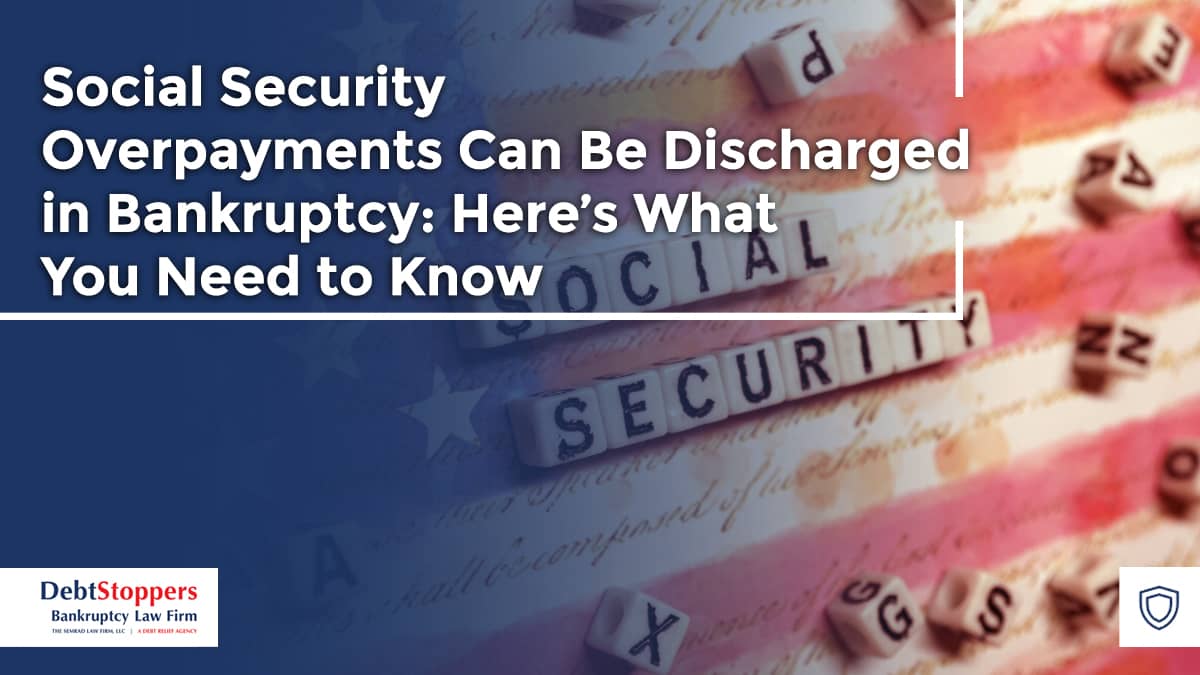Social Security Overpayments Can Be Discharged in Bankruptcy: Here’s What You Need to Know

Beginning in July 2025, the Social Security Administration (SSA) will begin withholding up to 50% of monthly benefits for certain recipients who received overpayment notices dated April 25, 2025 or later. This marks a significant shift from the current withholding policy and has understandably caused confusion and fear for many beneficiaries, especially older adults and those on fixed incomes.
But here's what most people don’t realize: Social Security overpayments are often completely dischargeable in bankruptcy. And once you file, the government cannot continue to reduce your benefits in order to recover that overpayment.
This is not a loophole or some legal gray area. It’s well-established law and it may offer a crucial lifeline to individuals who are struggling to stay afloat.
What Is a Social Security Overpayment?
A Social Security overpayment occurs when SSA pays more than what someone was legally entitled to receive. This can happen for many reasons: changes in income, work activity, or even a delay in reporting a change in household status. It is surprisingly common, even for people who did nothing wrong.
Once SSA determines an overpayment occurred, it sends a letter demanding repayment. If you don’t act, the agency will reduce or withhold up to 50% of your benefits, seize tax refunds, or even garnish wages.
New July 2025 Rules Add Pressure
Under the SSA’s new rules:
If you received a retirement, disability, or survivor benefit overpayment and your notice is dated April 25, 2025 or later, SSA can withhold up to 50% of your monthly check.
If the overpayment relates to Supplemental Security Income (SSI), the limit remains 10%.
If your notice came before April 25, the withholding might be 10%, or, in some recent cases, 100%.
That means many Americans will see hundreds or even thousands of dollars taken from their checks without warning.

Bankruptcy Restores your Benefits
Here’s the good news: Filing for bankruptcy can immediately stop the government from reducing your benefits. In the vast majority of most cases, the overpayment is completely discharged, meaning you’ll never have to pay it back.
At my firm, we’ve filed hundreds of thousands of bankruptcy cases. We’ve seen just a handful of instances where a Social Security overpayment wasn’t discharged and those rare exceptions involved clear fraud, like intentionally lying on benefit applications.
Unless you committed fraud in obtaining the overpayment, and SSA would need to prove that, the debt is wiped out in bankruptcy.
The Law Is on Your Side
The legal basis is clear. The Bankruptcy Code treats most overpayments as general unsecured debts, just like credit cards or medical bills. That includes overpayments from federal agencies like SSA.
More importantly, the SSA itself recognizes your right to bankruptcy protection.
Their internal guidelines—available in the Program Operations Manual System (POMS), section GN 02215.185—state the following:
“To comply with the bankruptcy automatic stay:(a) immediately stop collection of any outstanding debt owed by the debtor who filed for bankruptcy, which arose before the date they filed the bankruptcy petition (‘pre-petition’ debt), whether or not they listed the amount of the debt in their petition; and(b) promptly issue a refund of any amount of pre-petition debt that was collected after the bankruptcy petition date.”
Let’s break that down:
SSA must stop collecting overpayments immediately when you file.
SSA must refund anything they collected after you filed—even if it was done automatically.
A Social Security “debt” is based on the month the overpayment occurred, not when SSA discovered it.
This means that even if SSA didn’t catch the overpayment until later, if the extra money was paid to you before your bankruptcy filing, the debt is pre-petition and must be included and discharged.
Real Relief for Real People
At DebtStoppers, we’ve helped many thousands of people keep their Social Security income intact by filing for bankruptcy protection. If you're receiving letters from SSA or your monthly benefits have been slashed due to an overpayment, don’t panic—you have rights.
Once you file, we notify SSA and they are legally obligated to stop the withholding. If they’ve already taken money from your check after the date of filing, we’ll work with them to get it refunded.
What If I Already Paid Some Back?
Even if SSA has already withheld some or all of the overpayment, those amounts may still be recoverable if they were taken within 90 days before you filed bankruptcy. SSA policy requires them to promptly refund those funds once notified of the bankruptcy. We’ve seen it happen, SSA complies with this policy when properly informed.
What If They Say It Was Fraud?
Only in cases where the SSA believes you intentionally lied or misrepresented facts to get benefits might they pursue a claim for nondischargeability. But these cases are rare, and they must be brought as an adversary proceeding in bankruptcy court. In our experience, this happens in fewer than 1 in 10,000 cases.
So unless you knowingly misled SSA to get money you weren’t entitled to, you don’t have to worry—the overpayment is likely dischargeable.

You Deserve Peace of Mind
The recent changes in SSA’s overpayment collection policy are stressful, especially for those already struggling to make ends meet. But you don’t have to face this alone and you don’t have to sacrifice half your monthly benefits.
Bankruptcy may be the solution. It’s fast, it’s powerful, and it can put a stop to unfair withholding and wipe the debt away for good.
Want to Learn More?
Better call DebtStoppers. We’re in Illinois, Georgia, and Texas and we regularly discharge Social Security overpayments in bankruptcy. If you or a loved one is facing reduced checks from SSA due to an overpayment, reach out now and get the protection you deserve.
Make life affordable. Want to learn more? Better call DebtStoppers!





